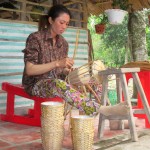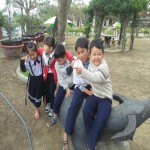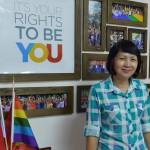
Nguyen Thi Hang, a mother of two school-aged children, lives in Vinh Long province in Vietnam’s Mekong Delta, where high poverty rates are prevalent among ethnic minority groups. For the last 14 years, Hang has earned a living for her family by making baskets and carpets from water hyacinth.
Le Thi My Dung has a rice paddy of less than 1 hectare—almost equivalent to a football field—to support and feed her family. Until recently, although she and her children worked the field every day, her earnings from rice sales barely covered her costs. Her field only yielded about 4 tons of rice per hectare, less than other farmers' similarly sized fields that yielded around 7 or 8 tons

April 2015—When Tho Nguyen was born 10 years ago in Danang, Vietnam, he was diagnosed with cerebral palsy—a congenital condition resulting from abnormal brain development that affects muscle coordination and movement.
Surrounded by almost 2,000 quacking ducks, Le Thanh Thuong reflects on the changes he has made on his duck breeding farm and hatchery in Can Tho, Vietnam. Previously, his ducks were free range—they drank water from a nearby pond and grazed on small fish and shrimp from rice paddies, which left them undernourished and susceptible to diseases like salmonella and parasites. Poor sanitation and insufficient separation between residential and production areas put his family and workers at risk for picking up diseases from the ducks.

When Dinh Thi Yen Ly’s 18-year-old son, Nguyen Dang Khoa, told her he was gay, she felt they were the most painful words she had ever heard. She didn’t understand what it meant for him or for her family; she thought being gay was a sickness. And Ly was not alone. Some studies show that many parents in Vietnam still think homosexuality is a disease, a trend or an abnormality.








Comment
Make a general inquiry or suggest an improvement.